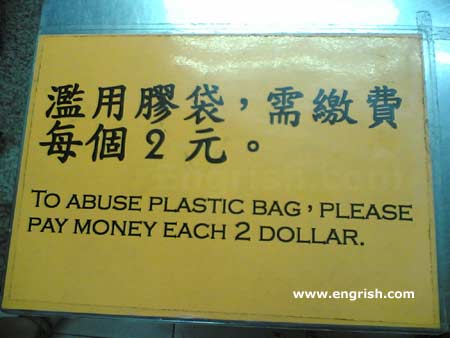 Last Saturday, I bought Fish Liver Oil Emulsion, a food supplement manufactured by a Chinese company named Qingdao Double Whale Pharmaceutical Co., Ltd. A leaflet, which contains a little explanation of the product and an instruction on dosage, came with it.
Last Saturday, I bought Fish Liver Oil Emulsion, a food supplement manufactured by a Chinese company named Qingdao Double Whale Pharmaceutical Co., Ltd. A leaflet, which contains a little explanation of the product and an instruction on dosage, came with it.
“Fish Liver Oil Emulsion, composed of fish liver oil, concentrated frash orange juice, vitamins A, D and C,” the leaflet said, “can improve health and promote growth, It is agreeable in taste, good for both women and infants, and will be more effective if administered frequently.”
I’ve spotted only two errors in this passage: one, the word “fresh” was misspelled as “frash.” Two, the punctuation that came after the first sentence should be a period, not a comma.
There are far worse examples than what I’ve just cited. The Manila Times columnist Efren Danao, on his recent trip to China, found more laughable examples of bad English:
One of the first signs that caught my eye when I landed at the Baiyun domestic airport of this city from Shanghai was the one that said: Flight Irregularity Service. When I inquired why somebody would provide service for flight irregularity, I learned that that was not really what was meant. The booth provides service for those whose flights were either cancelled or delayed and they needed to get another flight or hotel reservations.
And how about the road sign that said: “Do not drive tiredly” Or this one: “Take right lane to run.” Then, there is the sign warning against “Rear-end collision.” A collision is always head-on but rear end? Only in China.
Over at the New Yuan Ming Palace in Zhuhai City, there was a feature on the Monkey, Cow, and Tiger Heads, three of the 12 bronze water heads that were recovered from the French who stole them from the Ming Palace in the 19th century. And what happened to the remaining nine? “The other nine are in no direction,” the engraved information at the New Yuan Ming Palace explained.
Still, the English of the Chinese doesn’t in any way show that they have a puny mind. It only goes to show that English—or the lack of knowledge in it—is not a hindrance to success.
“There signs are amusing,” said Danao, “but I would not dare make any capital out of this. They are laughable but the state of Zhuhai is not. From a mere fishing village 29 years ago, it became one of the richest cities in China.”
Indeed, the examples above could make a straitlaced grammarian cringe. But look at China. Economically, it is performing way better than its Asian neighbors. Last year, it hosted the 2008 Olympics—a testament that China is a force to reckon with. And now that the world is reeling from a recession, said Fareed Zakaria, the U.S.A needs Beijing like never before.
How did it come to pass that from a mere “Sleeping Giant” China is now considered The New Economic Powerhouse. Was it because of their English?
Hardly.
Which is why I am wary of the argument of those who insist to make English as the medium of instruction. Proficiency in English, they say, is an imperative if one were to become globally competitive. As the world has become so globalized, it is but natural to learn to speak the international lingua franca, English.
This argument has a narrow view of what constitutes global competitiveness. To equate English proficiency with global competitiveness is to think of the language as the one and only requisite in competing with the rest. This is only correct to a certain extent. A good command of English could very well serve anyone who will be working as an English instructor or a call center agent.
As the rise of China shows, however, good English is not everything.
Pingback: Learn with your ears » Despite, not because of, their English « The Free Lancer
Pingback: The case for English proficiency « The Free Lancer